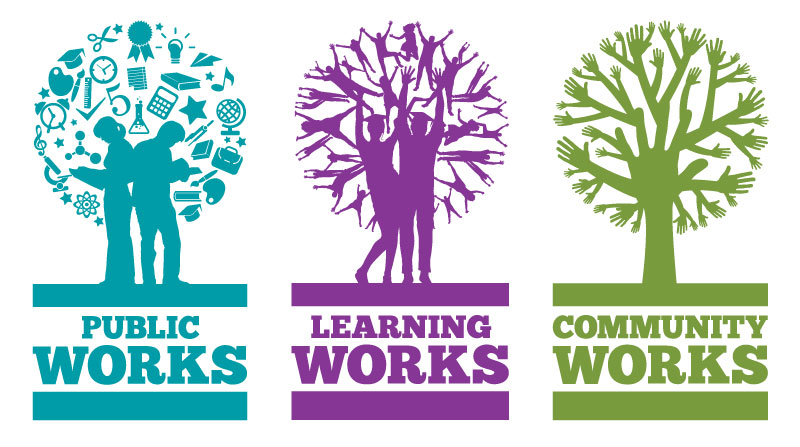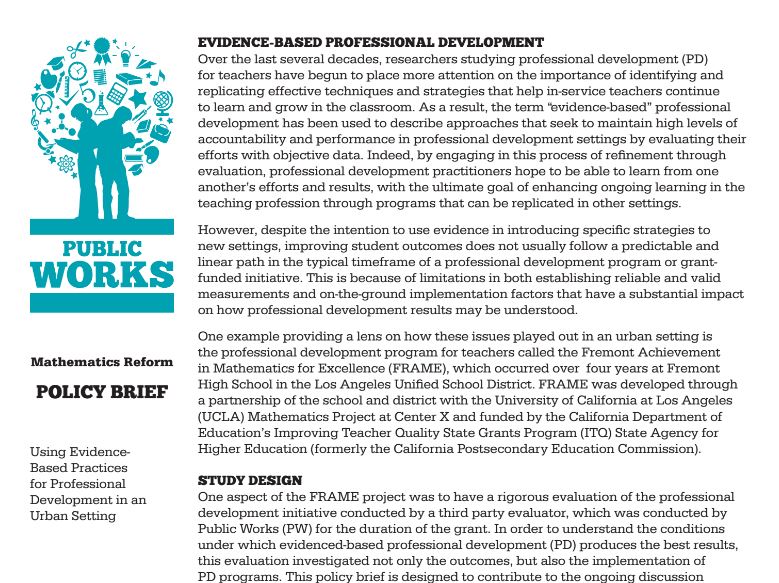COMMUNICATING RESULTS
Public Works has established a variety of strategies for our clients to communicate the results of evaluations and longer-term research projects. We believe that collecting, analyzing and using data improves the effectiveness of the public and non-profit sectors. We recognize our role in meeting reporting requirements for government and foundation funders while working efficiently to provide thorough reports for this purpose.
We are committed to providing documentation of our work that is thorough and complete. We also understand that other communication strategies are often needed. Examples of these include brief executive summaries, brochures, newsletters, policy briefs and other communication tools designed specifically for a particular audience or stakeholder group. Public Works identifies communication needs upfront but maintains an open and collaborative approach to adapt to particular needs that may arise and responds quickly.
Public Works also provides technical assistance, training and capacity building to support policy shifts and accountability requirements for new programmatic approaches. Examples of products for these kinds of projects include presentations and webinars, training guides, literature reviews, gap analysis reports and more. The following examples show a variety of products developed by Public Works, each customized to the needs of the client and funder of the project. Additional examples of reports and other work products are available upon request.
EVALUATION REPORTS
Public Works (PW) produces annual evaluation reports for reporting requirements and implements a more comprehensive analysis of data collected during the year. For the Whittier Union School District Reach for the Stars after-school program, a brief evaluation report included a one-year outcome study for the latest state test results and attendance outcomes.
For the GEAR UP grant program administered by the California State University at Dominguez Hills, PW produced two annual reports: one focused on qualitative information collected to inform implementation, and a second report that is based on quantitative student outcome data analyzed with a matched control group within LAUSD. In addition, PW used the information collected for the evaluation to contribute Annual Performance Reports to the US Department of Education, which funds GEAR UP.
For the California Mathematics and Science Partnership Program, where PW served as the statewide evaluator for more than twelve years, we provided annual evaluation reports focused on a different theme related to implementation as a broader perspective for the California Department of Education, which administered this federally funded initiative. The Year 12 report focused on the transition to new federal legislation under ESSA, and the Year 11 report focused on the program’s transition to STEM learning. We also prepared a summary report, mid-way through implementation that examined outcome data retrospectively in order to plan for evaluation and study of the program in the coming years.
Public Works has developed policy briefs to provide an interpretation of the results from an evaluation perspective, as they related to the particular policy framework for implementation of an initiative. One policy brief was developed for the UCLA Mathematics Project at Center X, to share the results of an evaluation of
Two literature reviews for STEM learning were developed to provide information to CDE and CaMSP-funded programs implementing new and innovative professional development to integrate science and mathematics with engineering and technology. These literature reviews provided a research framework for understanding the issues related to implementation, while also addressing the state’s transition to new math standards under the Common Core and Next Generation Science Standards initiatives.
Informing Partners and Disseminating Best Practices
As our work under the CaMSP initiative expanded to include the individual evaluations and reporting requirements for 55 partnerships under grant Cohorts 10 through 13, PW established a newsletter informing the partnerships of upcoming state and local evaluation tasks and requirements. This forum was used to highlight the best practices of partnerships related to professional learning, technology and curriculum development. We value the work of the projects and understood their need to share and learn from each other. These newsletters were one strategy we used to accomplish this connection across the state. We also produced short project summaries for each local evaluation that a project director could use for stakeholders and others in local forums to communicating project accomplishments and an understanding of evaluation results.
Training Guides and Presentation of Evaluation Results to Other Audiences
Based on the lessons learned from the implementation of Learning Works, our charter school was designed specifically to support re-engaging dropouts. We developed The Diploma Connection, Chasing and Advocating for In-school and Out-of-school Dropouts, Training Modules for Middle and High School Staff. These modules were designed to support the Pasadena Unified School District and were a companion piece to an evaluation of a federally funded High School Graduation Initiative.
PW presented the results of the local evaluation of the South Kern Math Partnership (SKMP) at the California Education Research Association’s conference. This presentation provided an important lens on the role of evaluation in establishing a partnership-based approach to collecting, documenting and refining professional development (PD) practices. As California transitions to an accountability model that blends state priorities and measures with the Local Control and Funding Formula (LCFF) and Dashboard system, teachers continue to need additional support in implementing new standards, curriculum and an engaging classroom culture. SKMP’s evidence-based PD project resulted in increased teacher content and pedagogical knowledge for math instruction; self-efficacy in teaching higher order math topics; and use of engaging practices and student activities.








